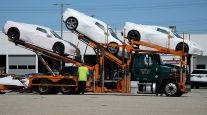Trucking Is Doing Better Than U.S. Economy; Double-Dip Recession Unlikely, Experts Say
This story appears in the Oct. 24 print edition of Transport Topics.
GRAPEVINE, Texas — Most trucking companies are currently doing better than the U.S. economy as a whole, and that should continue because a second, or double-dip, recession is unlikely, a panel of economists said.
They predicted that gross domestic product will grow by as much as 2.5% next year and that, while fleet owners should not dwell on the fear of economic collapse, unemployment will remain at least 8.5% through the year.
Three chief economists of national trade groups gave forecasts and policy recommendations here Oct. 17 during the Management Conference & Exhibition of American Trucking Associations.
Bob Costello, ATA’s chief economist, said trucking’s fate in coming months will be determined by two capacity issues: the industry’s combined fleet size relative to freight and the number of qualified commercial drivers.
“It’s a supply-side story in trucking. If the economy really took off, there would not be enough trucks to haul everything. The industry is now right-sized,” Costello said, meaning that companies can find business and generate revenue, but costs are an issue on several fronts.
More broadly, unless Europe collapses from the crush of sovereign debt in Greece, Ireland, Italy, Portugal and Spain, the United States should avoid another recession, at least through next year, said Martin Regalia of the U.S. Chamber of Commerce.
Regalia told moderator Stuart Varney of the Fox Business Channel that he does not anticipate such a collapse. Therefore, he thinks GDP growth will accelerate to 2.25% to 2.5% a year in 2012, but that would drive unemployment down only to 8.5% to 8.7% from the current 9.1%.
Costello said driver wages and other costs will be critical for trucking.
“Real weekly earnings — adjusted for inflation — for truck drivers have been essentially flat since 1990. We will soon see the worst driver shortage ever,” Costello predicted.
He also said diesel fuel and new truck prices are high, presenting a challenge for managers.
“You have to watch your costs,” he said.
The average price of a new, heavy-duty U.S. highway tractor hit $125,000 last year, up from $95,000 in 2006, Costello said. However, he still thinks fleets will continue to update their trucks in large numbers to avoid spending more on maintenance.
Costello said maintenance costs average 5 cents a mile at 500,000 vehicle-miles driven but rise sharply to 15 cents a mile when the truck hits 550,000 miles, which gives new truck buyers an incentive to purchase.
John Felmy of the American Petroleum Institute said he does not make price predictions, but he did offer policy recommendations. He also urged approval and construction of the Keystone XL oil pipeline from Canada to the United States.
Although some environmental groups have opposed the project, Felmy said he estimates the value of the oil to be moved at $17 trillion.
“Regardless of what the United States does, Keystone will be developed. It is worth it to Canada,” Felmy said, because that amount is equivalent to about 10 years of Canadian GDP. The only open question, he said, is whether the oil is sold in the United States or elsewhere in the world.
As for the United States, Felmy said Congress and the administration should avoid raising taxes on oil companies and should allow oil companies to develop more domestic energy sources. He said that would result in more jobs, more energy and, because of those first two, more tax revenue for the government.
Regalia offered suggestions for improving economic growth, including increasing activity by the energy sector by allowing more development permits. He also endorsed more U.S. trade agreements with other nations.
Weakness in the value of the U.S. dollar brings opportunities for tourism, Regalia said, so the federal government should make it easier for citizens of other nations “to visit here and leave their money.”
He also said he would like to see more federal spending on roads, bridges and other national infrastructure, and he predicted that some form of that spending will happen, although ATA President Bill Graves said during an MCE press conference that he was not optimistic about a complete highway reauthorization package getting passed and signed into law anytime soon.
Assessing trucking as a whole, Costello said the industry should outperform U.S. GDP growth, “especially if manufacturing continues to do well.” He also said he agreed with Regalia in that he does not expect a double-dip recession.




